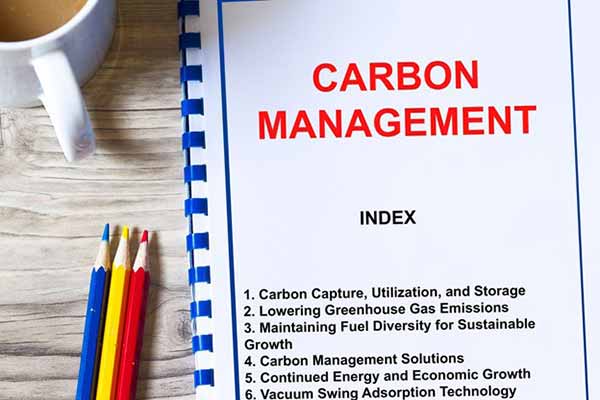The United States Department of Energy has announced it will soon make available over $2 billion, provided for under the bipartisan infrastructure law, to help companies advance the use of carbon capture technology. The funds will help development of technologies, as well as make it easier for industries that are hard to decarbonize to use carbon capture as a way to reduce their carbon footprint.
Meanwhile, California’s attorney general is investigating ongoing reports of deceit practiced by the fossil fuel industry in its decades-long campaigns to encourage recycling of plastic.
More Than $2 Billion for Carbon Capture Available Soon
Firms in the U.S. working on carbon capture technologies will soon be able to access more than $2 billion in funds from the government, drawing on money allocated in the bipartisan infrastructure bill for that purpose.
The money will be used to support development of the technologies that are still in their early stages and still very expensive.
The technologies being looked at will help industries and companies whose activities emit a lot of CO2 to capture the gas emitted and store it underground. Storage sites for the CO2 are being investigated and may include oil and gas fields that are no longer in use, such as those under the sea in the Gulf of Mexico.
The technology continues to be costly. One type of technology known as direct capture — which pulls the CO2 directly from the air, rather from the source industry — costs around $600 per ton of CO2 captured.
Experts said the funding from the U.S. Department of Energy will not only help companies move forward more quickly in developing and using the carbon capture technologies, but will also help lower the overall costs for any company seeking to use the technology for reducing its carbon footprint.
However, scientists have pointed out that the emphasis should be on reducing the production of emissions in the first place, to limit global warming. But some have acknowledged that in the interim the use of carbon capture may be necessary as part of the overall plan to halt climate change.
President Biden is hoping that by 2050 the country’s economy will be a net-zero producer of carbon emissions.
Government officials said carbon capture will remain necessary for several more years to help with decarbonizing certain industries in which it would be difficult to eliminate fossil fuels, including steel and cement.
Currently, more than a dozen labs in the U.S. are working on projects to support the removal of CO2. The Energy Department has set a goal of reducing the cost of carbon capture to $100 per ton of CO2 by 2050.
Some analysts suggest that for carbon capture technology to truly achieve economies of scale, the government will need to offer incentives for CO2 emissions captured and stored. Government officials said they preferred to rely on market forces to promote the growth of the market for carbon capture technologies.
Solar Industry Staggers Under Import Investigation
An investigation by the U.S. Commerce Department into the origins of imported solar parts has caused a slowdown in the development of solar energy projects and a likely reduction in new installed solar-energy capacity.
The department is investigating allegations that nearly $250 million worth of solar parts and panels imported from southeast Asia really originated in China and were produced there by forced labor.
Though the cases under investigation represent less than 2% of total industry imports, companies working in the industry said that it has caused many of them to become fearful and stop importing.
Industry experts said this has led to a slowdown in the rollout of new solar energy installations, and that the U.S. may only achieve less than half of the projected growth of solar installations in the country this year.
The investigation was launched following a complaint from a U.S. manufacturer of solar parts and panels who complained about the unfair competition being presented by the imported parts that were considerably cheaper.
Industry leaders said while they favor the idea of supporting a local supply chain, they felt that the investigation was counterproductive and not the best way to support local manufacturers of solar parts.
They suggested that Congress provide incentives for the growth of a U.S. solar parts-manufacturing industry.
Fossil Fuel Industry Under Probe Over Plastics
California officials have subpoenaed ExxonMobil to supply information and documents in regard to statements made supporting plastic recycling.
The officials are investigating allegations that the fossil fuel industry has engaged in a decades-long, disingenuous campaign to mislead the public about plastic use and the possibility of recycling it in order to support plastic production.
It’s alleged that for decades the industry produced ads and encouraged activities destined to encourage consumers to take responsibility for recycling plastics, while knowing full well that such recycling would be of little effect. To date, only 10% of plastics worldwide have been recycled.
California’s attorney general said the fossil fuel industry deliberately sought to mislead the public and perpetuate a myth about the viability of plastic recycling, despite acknowledging in internal documents that such a goal was unattainable.
The attorney general said he wasn’t prejudging the outcome of the investigation, but wished to ascertain whether collusion and deception were continuing.
Industry officials have denied the allegations of deception, pointing to their efforts to promote advanced recycling technology, as well as tackle the issue on a national and international level.
However, international media have published several stories detailing how the fossil fuel industry has been lobbying diligently to hamstring legislation that would curtail the production and use of plastic.
One investigative story in 2020 showed the industry pushing U.S. government officials to force a major African country to accept shipments of plastic waste in exchange for favorable trade terms.
Plastics are derived from petroleum products, including natural gas and oil.
Proposal to Give £1,000 Rebate on UK Energy Bills
A proposal to reduce the energy bills of 10 million British households in October by £1,000 ($1,234) has been made by Scotland’s energy company, Scottish Power.
In presenting the proposal, the company told the government that its plan — to give each household a £200 ($248) credit which would be repaid over five years — was unrealistic and wouldn’t meet the very real needs of millions of British households.
Scottish Power is suggesting the government establish a fund paid for by all U.K. residents over the next 10 years, which would pay for the proposed 1,000-pound rebate.
The company’s chief executive warned the government that the scheduled raising of the price cap on energy in October would likely result in some British households paying as much as 3,000 pounds ($3,701) for energy this year, and many would simply stop paying their energy bills.
He warned that millions face the specter of fuel poverty this coming winter if more isn’t done to address the crisis.
Refusing to raise the price cap in October is also not the answer, Scottish Power said, since few energy firms could continue in business without an increase in the price they charge for supplying energy — as the price of fuels went up substantially during the past year.
Scottish Power is owned by a Spanish company and the U.K. government was warned that energy companies owned by foreign multinationals may find it difficult to persuade their parent company to continue operating at a loss.
The U.K.’s chancellor has said no more help will be offered to householders, beyond that already offered, until autumn when the actual new price cap will be established.
Government officials are also not certain that the pleas of energy firms are due to them experiencing genuine financial distress. However, the agency responsible for setting the price cap said it would consider adjusting the price cap more frequently than every six months if the cost of fuels warranted it.
Firm in South Africa Launches Hydrogen Truck
The platinum mining firm Anglo American unveiled the largest hydrogen truck ever seen to service its mine in northeast South Africa.
The hydrogen truck, which uses energy derived from solar-powered electrolysis of hydrogen, carries about 300 tons of ore. It’s the first one planned by Anglo American to replace its diesel-powered truck fleet. The company has said it intends to convert all of its diesel engine trucks in due course.
Anglo American said the conversion of its trucks to hydrogen fuel could reduce its diesel emissions at its mines by as much as 80%, and is in line with its goal of operating carbon-neutral mines by 2040.
Weighing over 200 tons, the truck is roughly the size of a small house and runs on 2 megawatts of hydrogen fuel cells.
Opinion writer: Jewel Fraser
The opinions, beliefs, and viewpoints expressed by the various authors do not necessarily reflect the opinions, beliefs, or viewpoints of Interactive Energy Group, LLC (IEG) or its parent companies or affiliates and may have been created by a third party contracted by IEG. Any content provided by the bloggers or authors are of their opinion and are not intended to malign any individual, organization, company, group, or anyone or anything.
Brought to you by energysavings.com
All images licensed from Adobe Stock.
Featured image:



